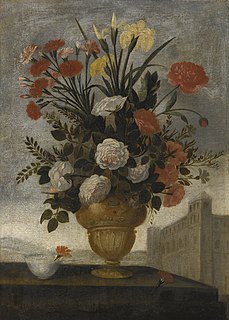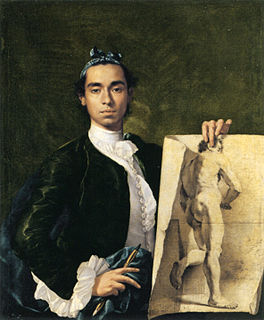 W
WJuan de Arellano was a Spanish painter of the Baroque era who specialized in floral still life paintings.
 W
WPedro de Camprobín Passano was a Spanish Baroque painter who specialized in still-lifes; primarily flowers.
 W
WGabriel de la Corte was a Spanish painter specializing in the painting of vases, baskets, garlands and signboards, that he had learned to paint without help of any teacher. Although he was a prolific artist he had little success and lived in poverty. In this context Gabriel was selling his works "on account of the necessity", at a very low price, and some of the Madrid painters of that time charged him with the job of helping them in their minor works.
 W
WJuan de Espinosa,, Spanish Baroque painter specializing in still life painting. There is a great deal of confusion in the documentation of de Espinosa's life and works because there are a number of artists using the same name who also painted still lifes around the same time.
 W
WAlonso Miguel de Tovar, sometimes called Tobar (1678–1752) was a Spanish baroque painter, appointed court painter by Philip V in 1723.
 W
WJuan Bautista de Espinosa (1590–1641) was a Spanish painter. Much of his work, which included religious paintings and portraits, is now untraced, and his few known extant paintings are all still lifes.
 W
WSebastián Gessa y Arias was a Spanish painter; known as El pintor de las flores, for his dedication to floral themes, bodegones and still-lifes.
 W
WJuan van der Hamen y (Gómez de) León was a Spanish painter, a master of still life paintings, also called bodegones. Prolific and versatile, he painted allegories, landscapes, and large-scale works for churches and convents. Today he is remembered mostly for his still lifes, a genre he popularized in 1620s Madrid.
 W
WAlejandro de Loarte was a Spanish painter, active during the late Renaissance and early Baroque periods. He specialized in still-lifes.
 W
WLuis Egidio Meléndez (1716–1780) was a Spanish painter. Though he received little acclaim during his lifetime and died in poverty, Meléndez is recognized as the greatest Spanish still-life painter of the 18th century. His mastery of composition and light, and remarkable ability to convey the volume and texture of individual objects enabled him to transform the most mundane of kitchen fare into powerful images.
 W
WBartolomé Montalvo was a Spanish painter born in Sangarcía near Segovia. He was a pupil of Zacarías Velazquez. He was admitted to the Real Academia de Bellas Artes de San Fernando on 6 April 1814. In 1816 became pintor de cámara for King Fernando VII. He specialized in painting landscapes, hunted animals and still lifes (bodegones). When Montalvo died, he had been for years lieutenant director of the Academy.
 W
WJosefa de Óbidos was a Spanish-born Portuguese painter. Her birth name was Josefa de Ayala Figueira, but she signed her work as, "Josefa em Óbidos" or, "Josefa de Ayalla". All of her work was executed in Portugal, her father's native country, where she lived from the age of four. Approximately 150 works of art have been attributed to Josefa de Óbidos, making her one of the most prolific Baroque artists in Portugal.
 W
WBartolomé Pérez de la Dehesa was a Spanish painter of the Baroque period.
 W
WFelipe Ramírez was a Spanish painter of Seville, active as a still-life painter during the 17th century. He was probably a relation of Gerónimo Ramírez, and was active at the same period. He painted hunting-pictures, dead game, birds, and various other subjects. He also painted a Still Life with Cardoon, Francolin, Grapes and Irises which is now at the Museo del Prado in Madrid and a Martyrdom of St. Stephen for a church in Seville, Spain.
 W
WJuan Sánchez Cotán was a Spanish Baroque painter, a pioneer of realism in Spain. His still lifes—also called bodegones—were painted in an austere style, especially when compared to similar works in the Netherlands and Italy.
 W
WTomás de Yepes or Hiepes was a Spanish painter in the Kingdom of Valencia. An artist of the Baroque movement, he worked as a painter of bodegón and still life. He made paintings for clients and public events; although he is noted to be active since the second decade of the 17th century, earliest works attributed to him come from 1642. He continued to paint until the year of his death.